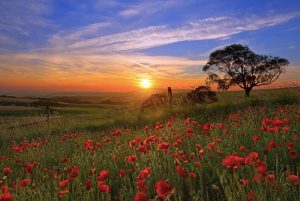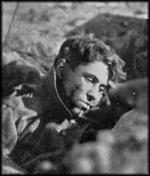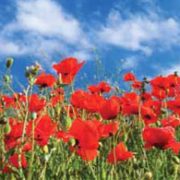THE PITY OF WAR: ARMISTICE DAY CENTENNIAL
THE PITY OF WAR:
ARMISTICE DAY CENTENNIAL
NOVEMBER 11, 1918-NOVEMBER 11, 2018
 Oh the First World War, boys, it came and it went / And the reason for fighting I never did get / But I learned to accept it / Accept it with pride / For you don’t count the dead / When God’s on your side. – “With God On Our Side,” by Bob Dylan
Oh the First World War, boys, it came and it went / And the reason for fighting I never did get / But I learned to accept it / Accept it with pride / For you don’t count the dead / When God’s on your side. – “With God On Our Side,” by Bob Dylan
Oh I marched to the battle of the German trench / In the war that was supposed to end all wars / I must have killed a million men / And now they want me back again / But I ain’t marching anymore. – “I Ain’t Marching Anymore,” by Phil Ochs
This book is not about heroes—English poetry is not yet fit to speak of them… My subject is War, and the pity of War. The Poetry is in the pity… – Preface to Wilfred Owen’s “Poems”, published posthumously, inscribed on the slate monument to16 British war poets memorialized in the Poets Corner of Westminster Abbey.
I have a rendezvous with Death / At some disputed barricade, / When Spring comes back with rustling shade / And apple-blossoms fill the air— / I have a rendezvous with Death / When Spring brings back blue days and fair. – “I Have a Rendezvous With Death,” by Alan Seeger (Pete Seeger’s uncle)
Imagine there’s no countries / I wonder if you can / Nothing to kill or die for / A brotherhood of man / Imagine all the people / Living life in peace… by John Lennon
One could go on and on. But that gives you a flavor of what compels me to devote this last column of 2018 to Armistice Day—the Centennial—which comes up this November 11, at precisely the 11th hour of the 11th day of the 11th month of 2018. One hundred years ago will be the time and date Armistice was declared. Since the “war to end all wars” ended there have been literally countless wars our country has engaged in, with no end in sight. We are still bogged down in Afghanistan—“the graveyard of empires” —and Iraq. World War Two, Korea, Vietnam, North and South, Nicaragua, El Salvador, Grenada, Iraq 1 and II, Afghanistan, the Cold War. But my subject is not just what Wilfred Owen—England’s greatest soldier-poet—called The Pity of War, but the soundtrack of the war, the folk music and poetry that grew out of it—both during and after, in particular its soldier-poets.
I Didn’t Raise My Boy to be a Soldier, (1915, Lyrics by Alfred Bryan, Music by Al Piantadosi) was America’s first and best-known antiwar song of World War I. George M. Cohan’s Over There and You’re a Grand Old Flag were the best known patriotic pro-war songs of the war, written by the son of Irish immigrants. God Bless America, written by Russian immigrant Irving Berlin during World War I, was not actually performed and recorded until World War II—by Kate Smith. But it was inspired by World War I. Till We Meet Again, was the most popular song of the war, written by or for an American soldier about to depart for Europe. I have sung all these songs at retirement homes for the elderly who had personal memories of their family involvement in the war. I pride myself on singing songs to “comfort the afflicted, and afflict the comfortable,” (H.L. Mencken’s phrase) and these are songs to comfort the afflicted.
In the early part of the war, which began with what historian Barbara Tuchman memorably called The Guns of August (1914), the English war poets tended to support and celebrate the patriotism of their involvement. Most notable was Rupert Brooke, their most famous poet of the gung-ho period before the reality of war became apparent and before, like so many would, he became a casualty of it. Brooke enlisted in August, 1914, at the very beginning and died of sepsis from an infected mosquito bite on board a French ship bound for Gallipoli. As fate would have it, he died on Shakespeare’s birthday, April 23, 1915—one poet to another. Here is his sonnet, The Soldier, which he wrote in January, 1915, three months before his death, for Edward Marsh, editor of Georgian Poetry—in a manuscript which Marsh donated to the British Museum after Brooke’s death. The two changes in the poem reflect the actual manuscript version.
The Soldier
By Rupert Brooke (1887-1915, Warwickshire, England)
If I should die, think only this of me,
That there’s some corner of a foreign field
That is for ever England. There shall be
In that rich earth a richer dust concealed,
A dust whom England bore, shaped, made aware,
Gave, once, her flowers to love, her ways to roam,
A body of England’s, breathing English air,
Washed by the rivers, blest by suns of home.
And think
Think, Too, this heart, all evil shed away,
A [ ] pulse in the eternal mind, no less
Gives somewhere back the thoughts by England given,
Her sights & sounds; dreams happy as her day;
And laughter, learnt of friends; and gentleness,
In hearts at peace, under an English heaven.
 The opening two stanzas of Rupert Brooke’s poem Dust were set to music by guitarist Danny Kirwan of Fleetwood Mac and appear on their 1972 album Bare Trees. Here they are:
The opening two stanzas of Rupert Brooke’s poem Dust were set to music by guitarist Danny Kirwan of Fleetwood Mac and appear on their 1972 album Bare Trees. Here they are:
When the white flame in us is gone,
And we that lost the world’s delight
Stiffen in darkness, left alone
To crumble in our separate night;
When your swift hair is quiet in death,
And through the lips corruption thrust
Has stilled the labour of my breath —
When we are dust, when we are dust! –
George M. Cohan wrote Grand Old Flag after visiting an American military base in Europe during the war. He was being shown around the base by the sergeant, who pointed to the roof of a barrack where a tattered old flag was barely flying; he commented, “It doesn’t look like much, Mr. Cohan, but it’s still a grand old rag.” That’s what inspired Cohan to write his song with his words in mind, as “The Grand Old Rag.” He was finally convinced that it might be taken as an insult to Old Glory, so he changed it to “The Grand Old Flag.” Who knows, but the original version and story behind it may have inspired Johnny Cash’s Ragged Old Flag:
On Flanders Field in World War I,
She got a big hole from a Bertha Gun,
She turned blood red in World War II
She hung limp, and low, a time or two, …
The greatest contemporary song to invoke and recreate the tragedy of World War I is Eric Bogle’s The Band Played Waltzing Matilda, about the aforementioned Gallipoli Campaign (April 25, 1915-January 8, 1916), a major land and sea operation of World War I, where Australian, New Zealand, French and English soldiers were killed in horrific numbers unsuccessfully trying to invade Turkey. Bogle wrote it in 1971 as an anti-Vietnam war song—which he set during World War I because Australians were much more familiar with that war. The connection to Vietnam was picked up right away despite its historical distance—a classic example of using history to comment on contemporary events and issues. (Cf. my review of David Rovics’ The Musical History Tour for a broader discussion of this theme.)
An exerpt from Eric Bogle’s And The Band Played Waltzing Matilda:
Now when I was a young man, I carried me pack, and I lived the free life of a rover
From the Murray’s green basin to the dusty outback, well, I waltzed my Matilda all over.
Then in 1915, my country said, Son, It’s time you stopped rambling, there’s work to be done.
So they gave me a tin hat, and they gave me a gun, and they marched me away to the war.
And the band played Waltzing Matilda, as the ship pulled away from the quay
And amidst all the cheers, the flag-waving and tears, we sailed off for Gallipoli
And how well I remember that terrible day, how our blood stained the sand and the water
And of how in that hell that they called Suvla Bay, we were butchered like lambs at the slaughter.
Johnny Turk he was waiting, he’d primed himself well. He shower’d us with bullets, And he rained us with shell.
And in five minutes flat, he’d blown us all to hell, Nearly blew us right back to Australia.
But the band played Waltzing Matilda, when we stopped to bury our slain.
We buried ours, and the Turks buried theirs, then we started all over again….
I also wrote a song about World War I, when I read the obituary of the last surviving British “Tommy” from the war, The Ballad of Harry Patch. It opens:
It took four men to hold him down
Cause they had no anesthetic
They pulled the shrapnel out his groin
Harry Patch would never forget it
The last surviving fighting Tommy
Hero of World War 1
They laid England’s best to rest today
He was a hundred and eleven years young.
Chorus: On the day they printed his obituary
There were fourteen more deaths in the US military
From Afghanistan to Iraq with a story to tell
So if you want to honor Harry Patch
Remember his words like the medals attached
“Give the leaders each a gun let them fight it out among themselves.”
He heard his comrade’s dying word
As he pleaded with Harry, “Shoot me”
But before he could pull his revolver out
That word just drilled right through me
He might as well have been his own brother
The last word that he gasped was “Mother”
They left that out of the posters
That shout, “Recruit me.” (Ch.)
The most famous poem of all to be written during the war was Canadian Lieutenant Colonel John McCrae’s patriotic lament for a fallen comrade, In Flanders Fields:
In Flanders fields the poppies blow
Between the crosses, row on row,
That mark our place: and in the sky
The larks still bravely singing fly
Scarce heard amid the guns below.
We are the dead: Short days ago,
We lived, felt dawn, saw sunset glow,
Loved and were loved: and now we lie
In Flanders fields!
Take up our quarrel with the foe
To you, from failing hands, we throw
The torch: be yours to hold it high
If ye break faith with us who die,
We shall not sleep, though poppies grow
In Flanders fields
~ Composed at the battlefront on May 3, 1915 during the second battle of Ypres, Belgium
Beyond Baroque and Ross Altman present The Soldier-Poets of World War I, Hosted by Ross Altman, PhD, Sunday November 11, 2018 7:00 PM, at Beyond Baroque (address below). November 11, 2018 marks the centennial of Armistice Day, 1918, the end of World War I. One week before, British poet soldier Wilfred Owen was killed in action. We celebrate the life and poetry of Owen, who wrote, “My subject is war, and the pity of war.” Along with Owen we celebrate and read from the works of a number of British and American poets who fought and died in the “war to end all wars,” including Rupert Brooke, Siegfried Sassoon, Edward Thomas, Alan Seeger (Pete Seeger’s uncle), Robert Graves, Isaac Rosenberg, John McCrae and others. It is uniformly agreed that their poems constitute an achievement in the art of poetry second to none—and the most moving antiwar poetry ever written. We remember their poetry with everlasting affection on the Centennial of the end of the war—Armistice Day.
Please join us for a celebration of “Poetry In a Time of War,” the title of a book by our special guest reader, Sherman Pearl, who joins Ross Altman to pay tribute to the 20th Century’s witness-bearing poets to “war and the pity of war.” We also welcome poet Michael C. Ford and Beyond Baroque Executive Director Richard Modiano to this celebration of the poet-soldiers of World War I. ~ During the 50th anniversary of Beyond Baroque Literary Arts Center 1968-2018. 681 Venice Blvd, Venice, CA 90291; (310) 822-3006; www.beyondbaroque.org
Ross Altman has a PhD in Modern Literature from SUNY-Binghamton; he belongs to Local 47 (AFM); Ross may be reached at greygoosemusic@aol.com













